The European STEM Teacher Award winners 2022
Thirteen STEM teachers won the European STEM Teacher Award at the European Science on Stage Festival 2022 in Prague, Czech Republic.

In the category "Collaboration in STEM Education":
How long does it take to "cook yourself in a closed car" - Miroslav Panoš and Kateřina Vágnerová, Czech Republic
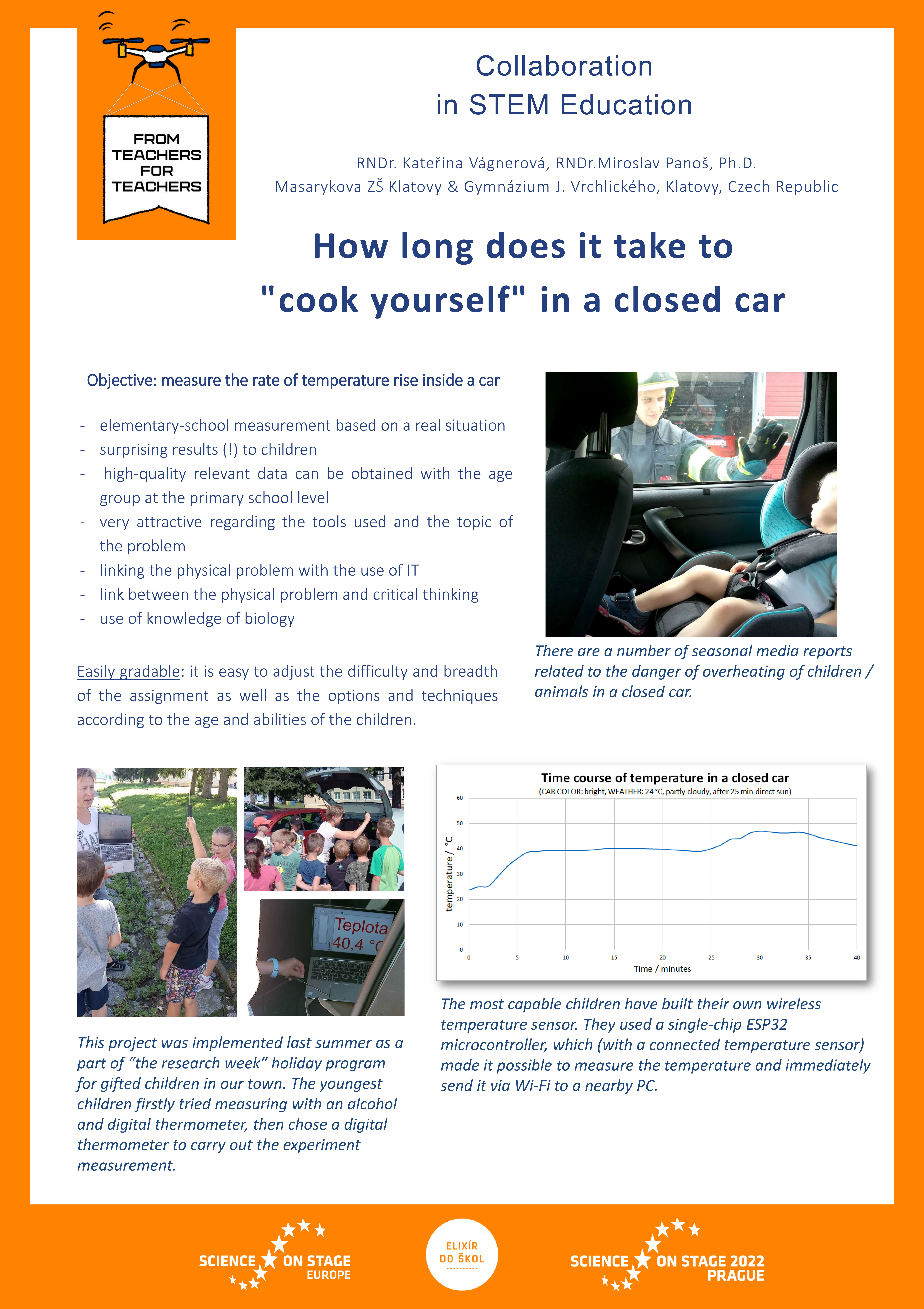 This project is based on a real situation, follows up on frequent media reports. The basic objective is to measure the rate of temperature rise inside a car. The project brings surprising results to children, and it is very attractive concerning the tools used and the topic of the problem. The whole project is easily gradable. It is easy to adjust the difficulty and breadth of the assignment as well as the options and techniques according to the age and abilities of the children.
This project is based on a real situation, follows up on frequent media reports. The basic objective is to measure the rate of temperature rise inside a car. The project brings surprising results to children, and it is very attractive concerning the tools used and the topic of the problem. The whole project is easily gradable. It is easy to adjust the difficulty and breadth of the assignment as well as the options and techniques according to the age and abilities of the children.
There is a link between the physical problem and critical thinking concerning the content of the media message and the use of knowledge of biology.
In the category "Diversity in STEM Education":
Dizziness from the windmill - Gabriela Pluciak, Poland
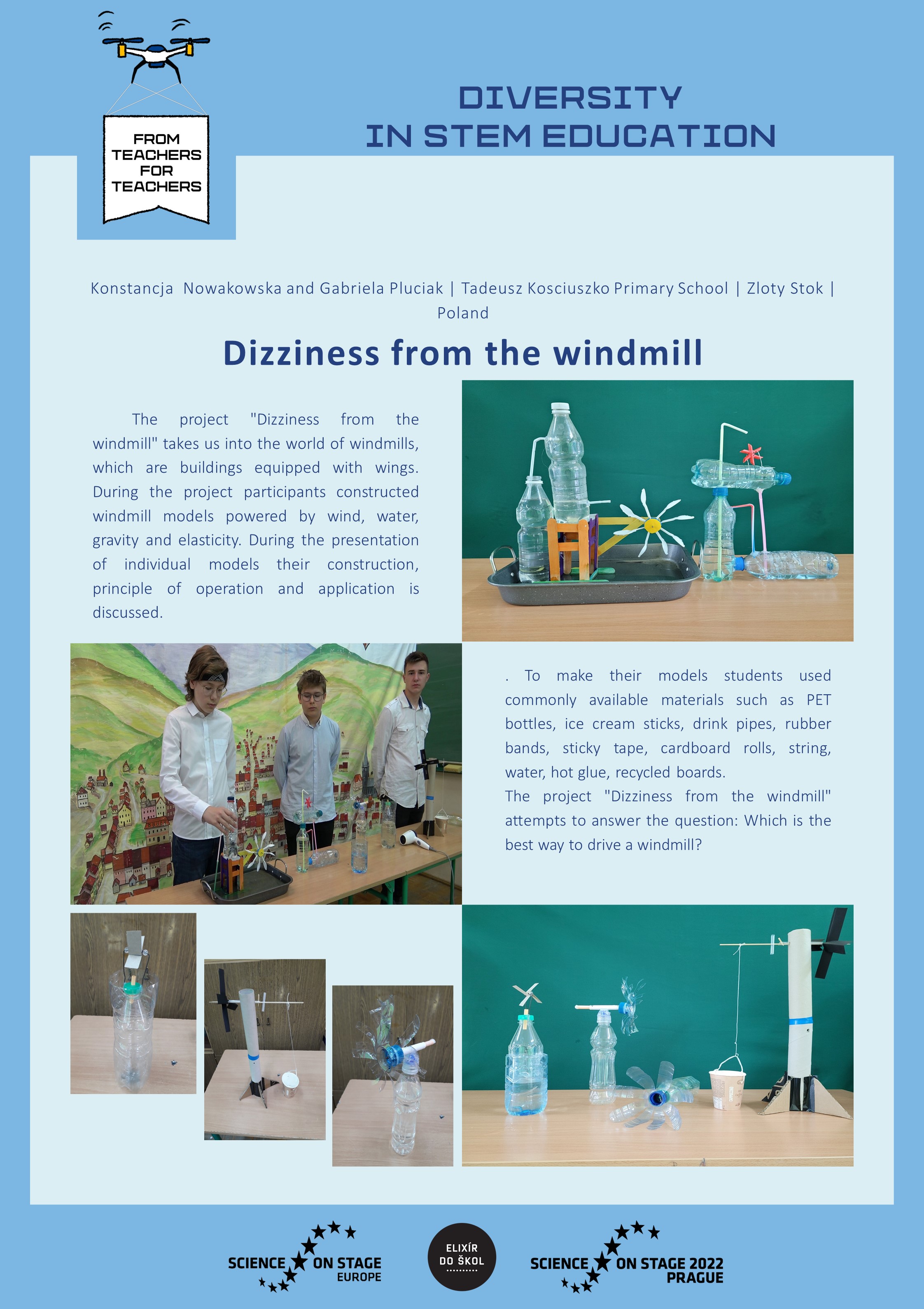 The aim of this project is to show the mutual exchange of different types of mechanical energy while driving windmills, i.e. buildings with wings. While realizing the project we were looking for an answer to the question: How can a windmill rotor be set in motion?
The aim of this project is to show the mutual exchange of different types of mechanical energy while driving windmills, i.e. buildings with wings. While realizing the project we were looking for an answer to the question: How can a windmill rotor be set in motion?
Participants constructed models of various types of windmills, which were driven by such forces as air, water, elasticity or gravity.
In the category "Joint Project":
Limonene/limoneno - Francesca Butturini, Italy and Javier Julian Fernandez, Spain
This is a remote Joint project on the molecular structure and characteristics of R and S limonene; plant metabolic pathways for the production of limonene; genes involved in limonene production; recognition of limonene with the human sense of smell and the genes involved; bactericidal and fungicidal function of limonene; extraction of limonene from citrus peel and characterization; uses of limonene; lemon taste teste for olfactory studies about Verona and Valencia indigenous people: these data will be processed and crossed with the bio-informatic data on the receptor protein of human olfactory cells to verify the statistical distribution.
In the category "Science for the Youngest":
Astrobiology: a new tool to engage primary school students into science - Dr. Juan Antonio Prieto Sanchez and Maria Pilar Orozco Saenz, Spain
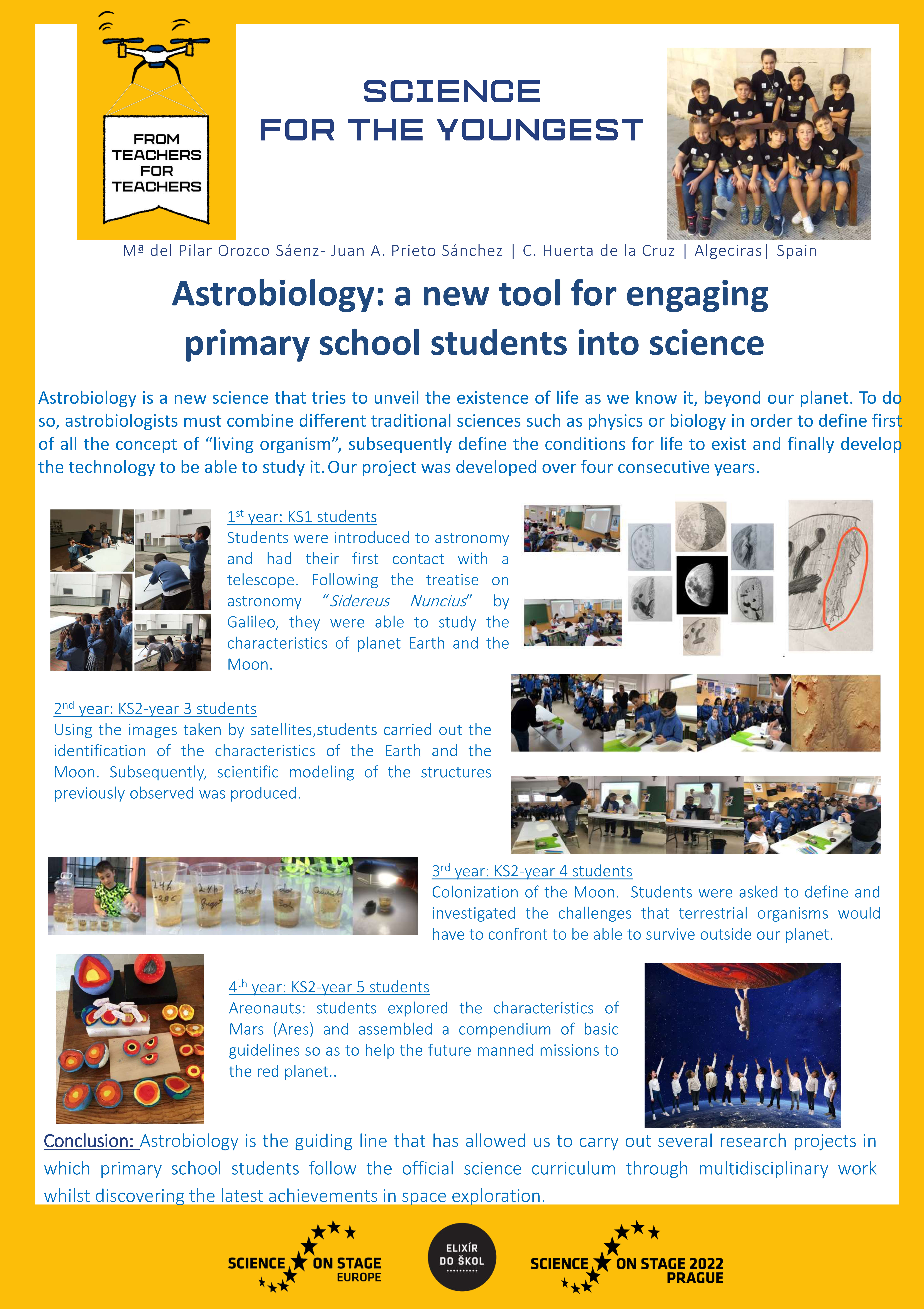 Astrobiology is a new science that tries to unveil the existence of life as we know it, beyond our planet. To do so, astrobiologists must combine different traditional sciences such as physics or biology to define first the concept of “living organism”, subsequently define the conditions for life to exist and finally develop the technology to be able to study it.
Astrobiology is a new science that tries to unveil the existence of life as we know it, beyond our planet. To do so, astrobiologists must combine different traditional sciences such as physics or biology to define first the concept of “living organism”, subsequently define the conditions for life to exist and finally develop the technology to be able to study it.
Astrobiology is in fact the guiding line that has allowed us to carry out several research projects in which primary school students follow the official science curriculum through multidisciplinary work whilst discovering the latest achievements in space exploration.
In the category "STEM with Arts":
Create and code your own artful cardboard robot (artful cardboard-bot) - Jan Günther, Maria Hellmann, Julia Trummheller, Germany
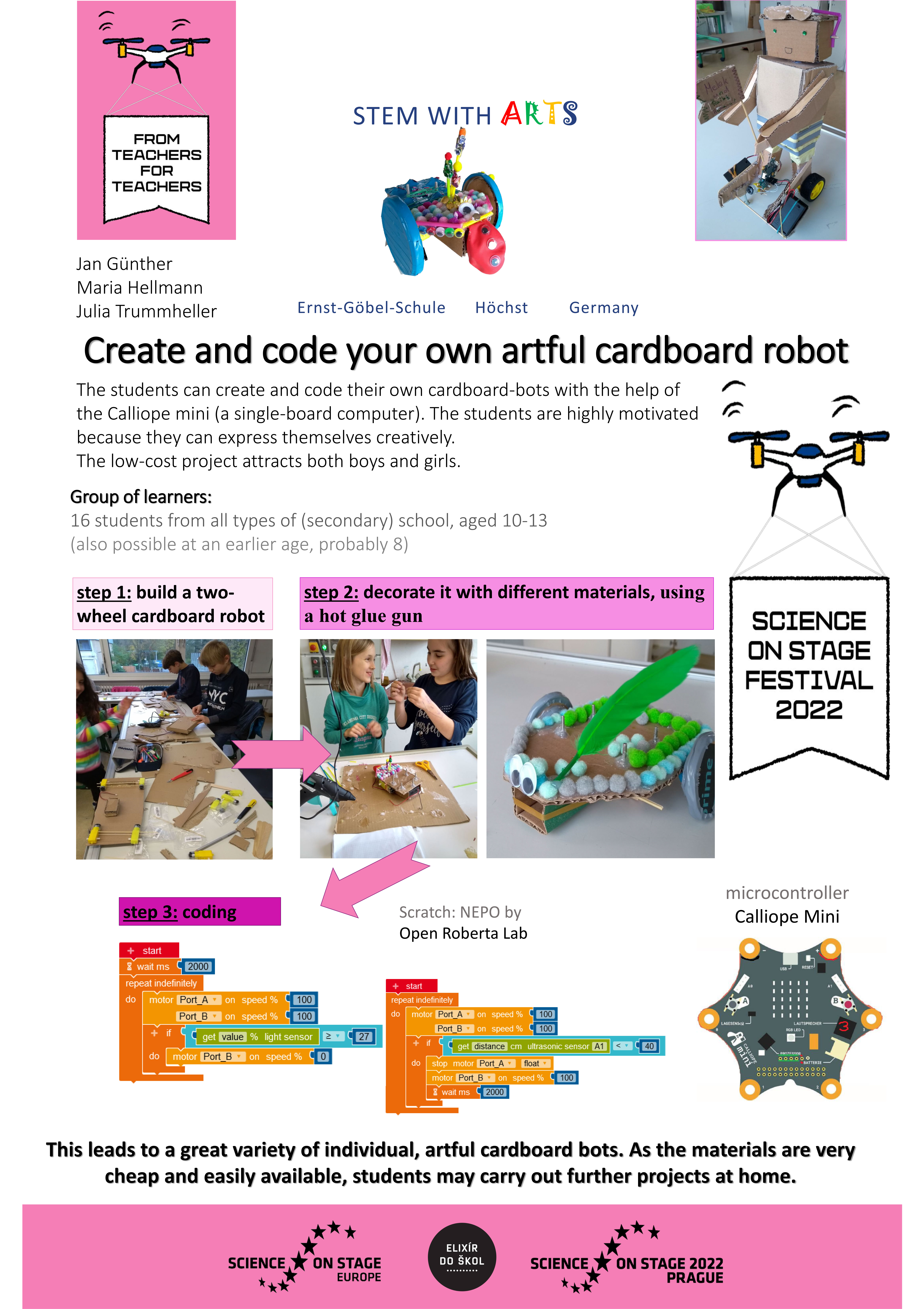 First, the students create their own two-wheel robots made of cardboard. Next, they decorate them with many different materials, using a hot glue gun. This leads to a great variety of individual, artful cardboard bots. As the materials are very cheap and easily available, students may carry out further projects at home. Second, the students are introduced to coding in general and the coding of a single-board computer (Calliope mini) to make their robots move. The programming language is NEPO, which is similar to Scratch, a block-based programming language. Since the project focuses on creativity, skilled manual work (soldering), and programming, it attracts both girls and boys.
First, the students create their own two-wheel robots made of cardboard. Next, they decorate them with many different materials, using a hot glue gun. This leads to a great variety of individual, artful cardboard bots. As the materials are very cheap and easily available, students may carry out further projects at home. Second, the students are introduced to coding in general and the coding of a single-board computer (Calliope mini) to make their robots move. The programming language is NEPO, which is similar to Scratch, a block-based programming language. Since the project focuses on creativity, skilled manual work (soldering), and programming, it attracts both girls and boys.
In the category "Sustainable Development Goals in Education":
Food for the 21st century, making a difference - Emma Crisell, United Kingdom
Working collaboratively with sixth formers, STEM professionals and members of the local community, my school’s project has focussed on three sustainable development goals -2 zero hunger, 3 good health and well-being and 13 climate action. We have investigated if it is possible to grow food at our school all year round, reducing food miles, promoting healthy food choices and prompting scientific lines of enquiry. This project is relevant to students every-day life. Through innovative approaches it has encouraged a love of gardening, improved working scientifically skills and has had a positive impact with all children, particularly those with additional needs.
In the category "Technologies in STEM Education":
"Defying" Gravity! - Dr. Georgios Chatzisavvas and Kalliopi Giannakoudaki, Greece
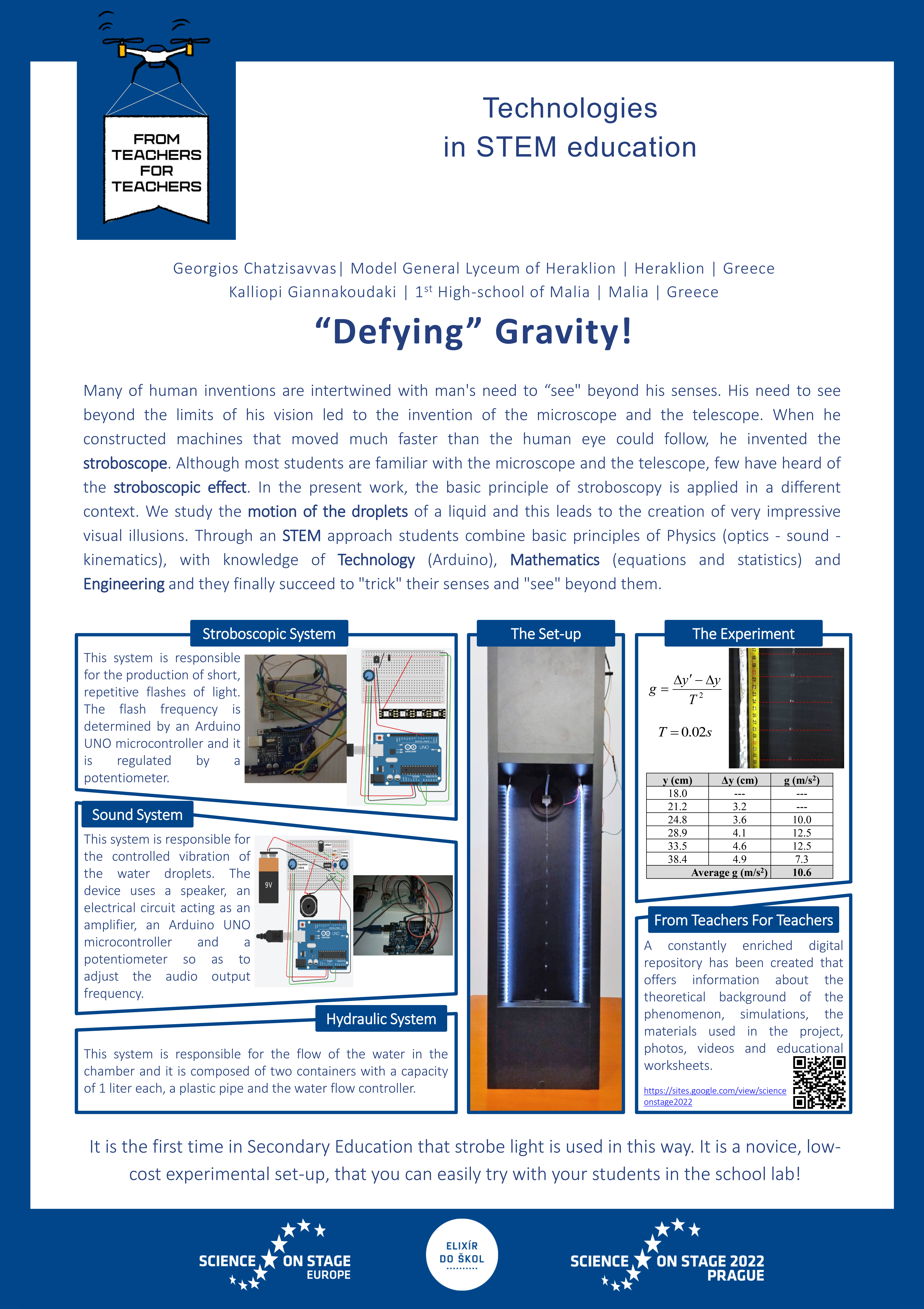 This project intends to introduce students to the phenomenon of stroboscopy through a STEM teaching approach. Students study the free fall of a water droplet by using the storboscopic principles. By changing the frequency of the flashes of LEDs, they observe that water droplets "defy" the law of gravity.
This project intends to introduce students to the phenomenon of stroboscopy through a STEM teaching approach. Students study the free fall of a water droplet by using the storboscopic principles. By changing the frequency of the flashes of LEDs, they observe that water droplets "defy" the law of gravity.
Thus, depending on the frequency of flashes, the drops might appear stationary or even move upwards.
In addition to the low-cost construction and observation of this very impressive phenomena, students also take measurements and by using the free fall equations adapted to the problem data, they finally calculate the acceleration of gravity with very good accuracy.